- Home
- Barry Unsworth
The Songs of the Kings: A Novel Page 2
The Songs of the Kings: A Novel Read online
Page 2
More to get the boy to look openly at him than for any other reason, Calchas said, “They are wagering on the result of this fight, isn’t it so?”
“They are laying bets, yes.”
“But what kind of betting can that be? The mass of them have nothing but what they stand up in, apart from their weapons, and those they can’t risk losing surely.”
Poimenos hesitated a little before replying. He was easily abashed when it came to speaking and had difficulty in finding words. “The bets are what you say you will give, they are like promises.”
“But that is always so with bets.”
“No, master, the promises are for when we take Troy.”
“Ah yes, I see. Then we will all be rich.” From the fabled spoils of the city the debt would be paid. A girl, a gold seal, a bronze tripod, a certain weight of amber or silver. It was a form of dreaming. In that great tide of plunder there could be no losers. He thought of the other tide, the one he had seen as the scented smoke rose to his nostrils and the voice came from below the ground in broken words and snatches of song. A flood of red between the banks and the armed bodies rolling in it like the tumbling of debris in the swollen waters of the Maeander River in early spring, which he remembered from childhood. “The dead won’t have to pay,” he said. “But of course those making promises expect to kill, not to die, don’t they?”
Poimenos might have found some answer to this, but Calchas did not give him time. Prey to sudden curiosity, he said, “Who will be the winner today, in your opinion?”
This time there was no hesitation. “Opilmenos, master. Opilmenos will win.”
Calchas looked at his acolyte for some time in smiling silence. The boy was particularly beautiful to him at this moment, touching too, his face radiant with the force of his opinion, not so much an opinion, the priest thought, as a view of the world. Poimenos had chosen the one who was better made, more handsome, more like the kind of hero he would have wished to be himself. These were the qualities that carried success, how could one live in a world in which things were otherwise? One day the boy would wake up in that world and never leave it again . . . With an intensity that brought the beginnings of tears to his eyes Calchas found himself hoping that this would not happen for a long time. In the candor and simplicity of the boy he had found solace and repose, a refuge from the tortuous purposes of the gods and his own tormented subtleties; and he never prayed to Pollein, whom the Greeks called Apollo, without remembering to give thanks for the gift.
Poimenos, emboldened by the kindness in the priest’s regard, now gave way to curiosity in his turn. “Master, which do you think will win?”
But Calchas shook his head, still smiling. A diviner of status did not indulge in unofficial forecasts even to those he held dear. The question was the one Chasimenos had asked; and he gave now the same reply: “I have no ideas on the matter.”
2.
The fire was out and he was already thinking of getting dressed when the army started to assemble. There was no need for him to make any immediate move. This was a military assembly, a marshaling of combatants. There was no place for him in these ranks, any more than for the priest of Zeus, or scribes like Chasimenos, or the bronzesmith and his slave assistants. He watched for a while, from this higher ground, as they formed up in rank upon rank on the shore under the direction of their officers and in accordance with the plans drawn up by Chasimenos, a naked host—in this hot weather they wore only loincloths and the improvised leggings essential for anyone moving about in the thorny scrub above the shore. The nakedness gave an impression of unity entirely misleading, Calchas thought, seeing how carefully the men were kept within their tribes, Molossians from the mountains of Epirus, Aetolians from the northern shores of the Corinthian Gulf, the seventy from Arcadia under their chief Inachus, speaking a language that did not sound like Greek at all. Then the combined force from the cities of the Argolis, headed by Mycenae, four hundred men, the core of the army, then Achaians and Messenians, then the Hellenes from Crete, under their king Idomeneus.
On they came, mostly in bands of not more than a few dozen, men of every physical type. They were silent and their footsteps were noiseless in the soft sand of the upper shore above the line of the dunes. There was only the loud sound made by the wind as it moved over the water, something between a hiss and a whistle, as if escaping from some vast puncture or breach in the sky. It was lower down, on the shingled ground, that the two men would fight, and a space was left there between the ranks.
They were still coming when he went back inside the tent to prepare himself for the meeting which was immediately to follow the fight. Agamemnon had not appeared yet, nor would he until all other movement was over, and only he was moving. Calchas felt a return of that earlier foreboding. Something would be expected from him. It was important that he should take care of his appearance.
It was hotter now inside the tent, with the sun striking through the canvas. Poimenos mixed oil with a little lemon juice in the shallow cup he always used and soothed it into his master’s skin where the skin was dry, as he had been taught to do, at the nape and over the shoulders and back and over the outer parts of the thighs. Under the pressure of the boy’s fingers Calchas felt his body loosen and relax, the fear and worry recede. Poimenos combed out the long dark hair, still tangled from sleep, applied scented oil to the temples and scalp, dressed the fringe of hair back from the forehead with thin-toothed bronze combs. The loincloth was abandoned and Calchas struggled into the long, close-fitting skirt with its pattern of sacred circles. He kept his eyes patiently closed so that Poimenos could blacken the lids and outer corners with kohl, and his face held still for the makeup, the application of which required much concentration, as the white circles had to be perfect in shape and the chalk paste made lustrous by the careful addition of sheep grease, which Poimenos kept in a small terra-cotta pot.
When all this was done and he had donned his amulets and necklace of amber constellation signs, he emerged again to find that the chiefs had now joined their contingents. Achilles, wearing a bored look as usual, stood with his Phthians; the ancient Nestor, flanked by his two sons, was at the head of the force from Pylos; Odysseus of Ithaca was there with his stocky, fair-bearded compatriots from the Western Islands. The chiefs were clothed above the waist in order to mark the distinction— they wore the usual sleeveless tunic and short kilt.
There was some talking now among the waiting men. They stood there in their ranks between the sea and the hills in the hot, gritty wind—there was no chill in the wind, though it came from the north, another mystery that had exercised Calchas. He saw that the Boeotians and Locrians, whose representatives were to fight, had been placed as far apart as possible. A wise move. But it was more complicated than that. Even within the ranks of the Boeotians care had been taken to separate the people of Orchomenus from those of Thebes, ancient foes with a long history of mutual pillage and murder. The Ainians and Atticans, who were in feud because of a rape not yet reciprocated and who shouted insults and threats at the sight of each other, had also been sited at the greatest possible distance apart. If the gods were to glance down at this formation, it would serve them as a chart or plan of all the bloody discords that riddled the host assembled here, the expeditionary force, as Agamemnon liked to call it. The delay caused by the wind was envenoming these divisions day by day, loosening what loyalties there were, setting the King’s authority more and more in doubt. It was why he had given his consent to this general assembly, this fight to the death. A spectacle would hold the men together, make them forget—at least for a while—their various discontents.
It would take more than this, Calchas privately thought, to keep such a rabble quiet for long. What did these people care about the pretext given out for the war, the honor of the house of Atreus, Helen’s flight with the Trojan Paris, a boaster who put it about that he had seen Aphrodite naked, looked at her from every side, and that the sight had enhanced his libido to such a phenom
enal degree that he now secreted semen as fast as he spent it? Who could take a man like that seriously? Even if it were true—a man might be favored, though undeserving— who but Menelaus would care about Helen’s multiple pleasures and repeated cries of joy? Troy meant one thing only to the men gathered here, as it did to their commanders. Troy was a dream of wealth; and if the wind continued the dream would crumble, Agamemnon’s authority would slip away and with it his command, that too like a dream gone wrong. Then it would be dangerous for those too close to him, people like Chasimenos. People like himself . . .
Now, as he watched, two guards brought out from the King’s tent his great throne chair, straining with the weight of it, while a third followed behind with his footstool. These were set down in the space that had been allotted to them, at the exact midpoint between the two masses of waiting men, separated as these were by the combat area itself, a rough square of pebbled ground, twelve paces by twelve, sloping slightly down towards the sea. Thus chair and stool occupied the dead center of this universe of the duel, a calculated effect and a triumph of planning on the part of Chasimenos.
A certain silence descended as all gazed at these emblems of the wealth and power of Mycenae: the high-backed chair of African ebony, incised all over its surface in an elaborate pattern of gold wires, with panels of alabaster at the sides; the footstool inlaid with figures of men and lions in ivory and silver and amethyst. He had had them brought by ox train over the rough roads from Mycenae to the sea at Lerna, and embarked them at the place where for his second labor Heracles slew the fearsome Hydra in the time of long ago. Agamemnon understood the importance of symbols. It had been the one mission the hero had been not able to accomplish alone; he had been obliged to call on the help of his charioteer Iolaus, who had come with burning brands and as Heracles chopped off the monster’s ravening heads had cauterized the wounds so the heads could not grow again. The vanquished Hydra was Troy, Iolaus represented the forces allied with Mycenae. All very well, so far as it went. But Calchas had not been happy with the choice of embarkation point. For one thing, there was the excessive pride, inviting rebuke or worse, of putting oneself on the same level as a demigod; and then there was the fact that the hero had taken the Hydra’s venom to poison his arrows, and it was this same venom, after many enemies slain, that had later devoured his own flesh. This placed a dark question over the future, adding to the fears and anxieties Calchas was always prone to and which he nowadays felt were increasing. When it came to symbols it was all or nothing, you could not pick and choose. But he had been afraid to say this to Agamemnon, whose displeasure could take violent forms. Troy meant wealth to Agamemnon too, and it was easy to see why he was always so in need of it. Chair and stool together, made to order by Cretan craftsmen with ivory and alabaster and gold from Egypt, amethyst from Syria, silver from Thrace, would be roughly equal in value to a year’s ration of grain and dried figs for a hundred of the slaves in the royal textile factories.
Now, after the calculated pause, he appeared at last, surrounded by six of his palace guard helmeted and armed with spears, who fell in around him as he emerged from the tent, men specially chosen for their height, which should exactly match his own—if they were taller, he feared it would enter the Songs that he was stunted of growth. The people of the Mycenaean League raised a shout at his appearance and their chiefs, Diomedes, Euryalus and Sthenelos, raised their arms to acclaim him. His brother Menelaus also shouted, as did the Spartan troops under his command. But many remained silent, so it was at best a ragged greeting he was given. Nonetheless, his darkly bearded face broke into a smile and he raised his right arm, palm outward, in acknowledgment. This smile showed the teeth, it was too broad for such scattered applause, or so it seemed to Calchas, and it was lasting too long. The guards held their spears upright, their faces without expression. The shafts of the spears shone in the sunlight, they formed the bars of a cage and Calchas felt his mind touched by gossamer wings. The King was waving and smiling inside a gilded cage. It was thus the mad were treated.
Agamemnon walked forward and seated himself and the guards fell into place around him. Still he made no signal for the proceedings to begin, but remained for some moments silent and motionless, sitting upright, his back not touching the chair. He had taken care with his appearance this morning, Calchas noted—just as he had himself. His dark, lustrous hair, thick and shaggy as the mane of an Argive pony, was combed out to his shoulders and he wore a gold circlet around the brows to keep the hair from his eyes in this wind. His robe was dark blue, color of royalty; it was belted and he wore a long dagger in a scabbard of polished leather at the belt.
There was a pause, filled by the sound of the wind and the cries of gulls circling above. Then the King raised his arm and brought it slowly down again. Shouts broke out and the two champions came forward from their places on opposite wings of the assembled army and walked down to the space marked out for them. Both wore the standard conical helmet with bronze cheekpieces and nose guards; and both carried the round oxhide shield and the heavy thrusting spear. But the Boeotian was more heavily armored, he wore a tunic of leather with bronze shoulder plates and he had chosen as his second weapon the short, broad-bladed stabbing sword. Stimon the Locrian had no sword, but he had a dagger slung low on his right side. For body armor he had nothing but a short coat of padded linen.
The two men came together and turned towards the King, standing side by side, waiting for his signal. When the nod came they moved quickly apart to the limits of the space. And now for a while it was as if they had decided to mock each other by imitation, circling with knees flexed, shoulders lowered in a crouch, spearpoints dipping slightly. For a space of time that was brief enough but seemed protracted to Calchas, watching with the fascination of the fearful, the two circled each other on the shingle. They were lost to everything, they had stepped into a private world from which only one would emerge to the life he had left, the waves, the painted hulls, the shit on the wind.
The movements were quicker now, from time to time the points of the spears snaked out in darting, feinting movements, caught by the sun in splinters of light. The Boeotian seemed stronger, twice his opponent took the shock of thrusts on his shield, heavy thrusts that briefly unsettled his balance. The sun of midmorning was still low enough to give a certain advantage to the one who had it behind him, and both men maneuvered for this position.
There comes always a moment, whether of fear, rage, confidence warranted or mistaken, when the first move is made, the definite one. Calchas knew this just as all those present knew it. Not a deliberate decision but a sort of gathering, depending on the god that prompts. It came now. Opilmenos made the drill movements he had learned when scarcely more than a child, raising and lowering his shield sharply, at the same time stamping the right foot, ploys to distract the other’s attention for a split second from his spearpoint, which he thrust forward now with all the weight of his body behind it, a lunge that carried him forward three paces, the point raised as he advanced until it was aiming at a spot just above his opponent’s collarbone.
Stimon could not block the thrust altogether, there was too much power in it, but he swayed to the right a second or two before the impact and thrust out his shield and so managed to deflect the spear across the right side of his body, not quite far enough, however: the point scored through the inner part of his arm, high up, below the shoulder. He took two staggering steps further to the right, exposing his flank. The padded linen of his tunic was suddenly red to the elbow on the right side. He had kept his grip on the spear but it seemed too heavy for him now, the point was hardly clear of the ground.
The sickness and exhilaration of prophecy fulfilled came to Calchas. This was the moment he had seen prefigured, watching the man dance in the firelight, the death contained in that fullness of life. It was what he had seen, what Pollein had guided him to see. As he waited now for Stimon to be killed he remembered that shaft of luminous conviction, felt some shivering return o
f it, the burden and tyranny of the god’s favor.
The Boeotian’s thrust had brought him too close to use his spear again without shortening his grip. This he now began to do, slamming his shield against his opponent’s left flank to give himself time. The movement was well executed, in the same drilled and robust fashion as his first thrust. But the staggering movements of the Locrian were transformed now, by a miracle of balance and coordination, into the first steps of a dance, taking him round almost in a half circle, helped by the push from the other’s shield, until he was sideways to the Boeotian, who had shortened his grip on the spear but had to make a half turn before he could deliver the killing stroke. It was the standard maneuver, the only possible one, but he was destined never to complete it. Stimon dropped his spear and sank to his knees. In a single movement he drew the dagger from his belt and made a wide, backhanded sweep with it. The blade flashed once and then dulled, as it sliced through the tendons behind the right knee. Opilmenos raised his face and opened his mouth wide and fell.

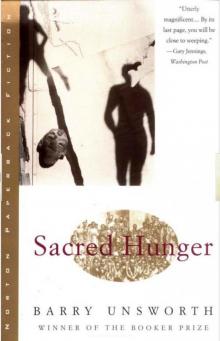 Sacred Hunger
Sacred Hunger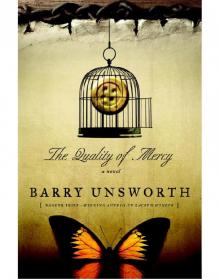 The Quality of Mercy: A Novel
The Quality of Mercy: A Novel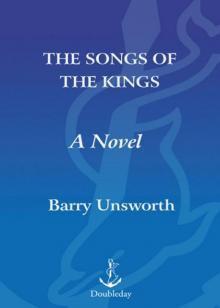 The Songs of the Kings: A Novel
The Songs of the Kings: A Novel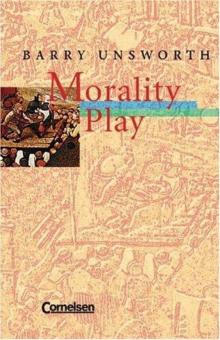 Morality Play. Mit Materialien. (Lernmaterialien)
Morality Play. Mit Materialien. (Lernmaterialien)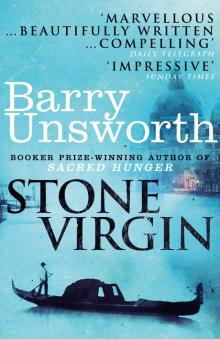 Stone Virgin
Stone Virgin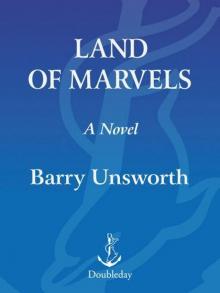 Land of Marvels
Land of Marvels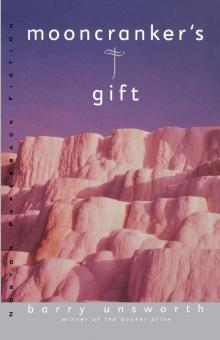 Mooncranker's Gift
Mooncranker's Gift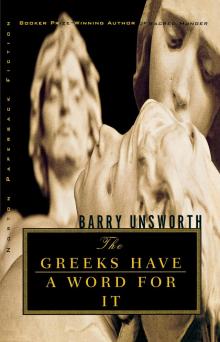 The Greeks Have a Word for It
The Greeks Have a Word for It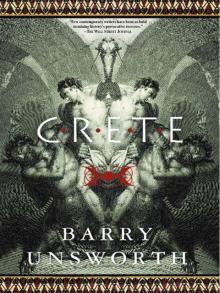 Crete
Crete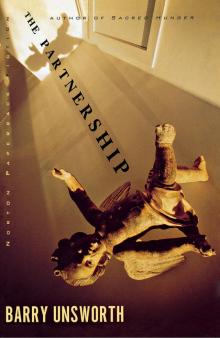 The Partnership
The Partnership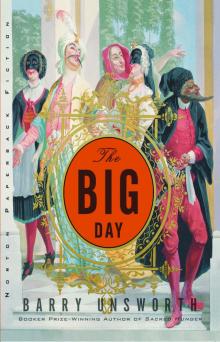 The Big Day
The Big Day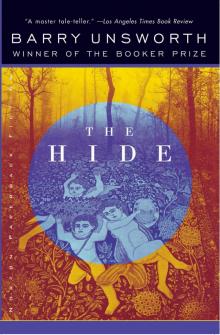 The Hide
The Hide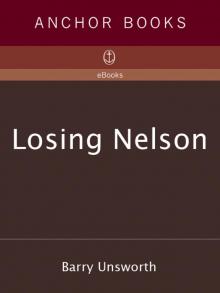 Losing Nelson
Losing Nelson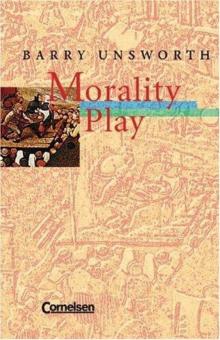 Morality Play
Morality Play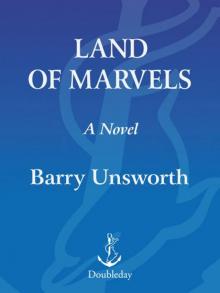 Land of Marvels: A Novel
Land of Marvels: A Novel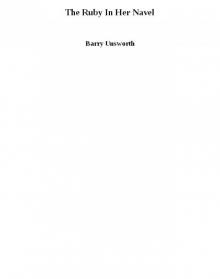 The Ruby In Her Navel
The Ruby In Her Navel